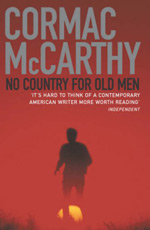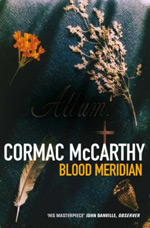- Welcome
- Noir Zine
- Allan Guthrie
- Books
"...those who enjoy the darker side of the genre are in for some serious thrills with this..."
Laura Wilson, The Guardian

Published in the UK by Polygon (March 19th, '09) and in the US by Houghton Mifflin Harcourt (Nov '09).
No Country for old men
by Cormac McCarthy
reviewed by Stephen Hawley
[Editor's note: this review is from July '07 and thus pre-dates the release of the Coen Brothers' movie]
 Texas, 1980. Llewelyn Moss is hunting antelope in the desert when he discovers the aftermath of a drugs burn: three truckloads of dead Mexicans and $2million dollars in a plain leather satchel. He takes it on the lam with the latter and finds himself tracked by ex-Special Forces officer Carson Wells, representing the drugs cartel, and freelance hitman Anton Chigurh, a psychopath with a penchant for offing his victims with a slaughterhouse stungun. Following in the killers' wake is local lawman Sheriff Bell, who hopes to arrest Moss before the underworld finds him and extracts its due.
Texas, 1980. Llewelyn Moss is hunting antelope in the desert when he discovers the aftermath of a drugs burn: three truckloads of dead Mexicans and $2million dollars in a plain leather satchel. He takes it on the lam with the latter and finds himself tracked by ex-Special Forces officer Carson Wells, representing the drugs cartel, and freelance hitman Anton Chigurh, a psychopath with a penchant for offing his victims with a slaughterhouse stungun. Following in the killers' wake is local lawman Sheriff Bell, who hopes to arrest Moss before the underworld finds him and extracts its due.
McCarthy is the most frustrating of contemporary novelists, a first class storyteller hamstrung by a crippling portentous streak. In No Country for Old Men, it appears that the former quality is in the ascendancy and by sticking to the contours of the contemporary thriller, McCarthy comes close to delivering a genre masterpiece. In the final quarter of the book, however, he remembers his status as 'literary' novelist and the story sputters and dies.
Nothing illustrates the split in McCarthy's sensibility more than his use of language. His writing often strains for the mythic, an effort that can result in such sub-biblical passages as this from Blood Meridian:
 A legion of horribles, hundreds in number, half naked or clad in costumes attic or biblical or wardrobed out of a fevered dream with the skins of animals and silk finery and pieces of uniform still tracked with the blood of prior owners, coats of slain dragoons, frogged and braided cavalry jackets . . . and all the horsemen's faces gaudy and grotesque with daubings like a company of mounted clowns, death hilarious, all howling in a barbarous tongue and riding down upon them like a horde from a hell more horrible yet than the brimstone land of christian reckoning, screeching and yammering and clothed in smoke like those vaporous beings in regions beyond right knowing where the eye wanders and the lip jerks and drools.
A legion of horribles, hundreds in number, half naked or clad in costumes attic or biblical or wardrobed out of a fevered dream with the skins of animals and silk finery and pieces of uniform still tracked with the blood of prior owners, coats of slain dragoons, frogged and braided cavalry jackets . . . and all the horsemen's faces gaudy and grotesque with daubings like a company of mounted clowns, death hilarious, all howling in a barbarous tongue and riding down upon them like a horde from a hell more horrible yet than the brimstone land of christian reckoning, screeching and yammering and clothed in smoke like those vaporous beings in regions beyond right knowing where the eye wanders and the lip jerks and drools.
He can, however, produce prose as lean and muscular as Hammett or Hemingway on a good day and, fortunately, it's this tendency that predominates in No Country for Old Men:
(Moss) unwrapped the shotgun and wedged it in an open drawer and held it and sawed the barrel off just in front of the magazine. He squared up the cut with the file and smoothed it and wiped out the muzzle of the barrel with a damp facecloth and set it aside.
This intensely visual style combines with McCarthy's ear for dialogue and a general absence of interior monologue to near cinematic effect. The novel could almost be adapted to film without benefit of a screenplay. It comes as no surprise therefore to find that No Country for Old Men follows All the Pretty Horses in having been optioned for the screen.
The narrative itself unfolds as the literary equivalent of a Peckinpah movie. The action takes place in the same Tex-Mex borderland that Bloody Sam made his own, and portrays a similar world, a world where human violence is reflected in the harshness of the desert landscape and women are relegated to supporting status in a male dominated environment.
The characters too seem to have stepped out of a Peckinpah flick, from old school Western lawman Sheriff Bell (a cinch for the late Richard Farnsworth) to the Satanic Chigurh, a villain who kick starts the action by garrotting a deputy with a pair of handcuffs and later decides the fate of Moss' wife on the toss of a coin.
No Country for Old Men is far more than just a movie in waiting, however. McCarthy catches the border dialect with what, to English ears, sounds complete authenticity. Characters are vividly limned. The prose is superb. And the story itself moves like an express train. For the greater part of the book, McCarthy handles his material like a master.
Unfortunately, at the three quarters mark, he loses his touch. The story comes to a halt. Everything falls apart.
Without giving away the denouement of the plot, it appears McCarthy's moral is that real life doesn't unfold like a thriller. The imposition of a naturalistic ending on a genre structure jars with all that has gone before, though. It doesn't work. The last fifty pages of the novel are basically redundant and consist of a series of musings by Sheriff Bell - the one character allowed an inner life by McCarthy - on his wartime experiences and the nature of human evil. Writers of McCarthy's stature can seemingly get away with things that would have been spiked if submitted by a tyro, to the ultimate detriment of the book.
Is the novel still worth reading? Definitely. The containment of a mainstream talent within a genre framework has produced explosive results. Even with the disappointment of its final chapters, the book merits the purchase price. And if the eventual screenwriter provides a suitable plot resolution, cinemagoers are in for a stunning movie experience somewhere in the near future.
# # #
Copyright © Stephen Hawley, 2007
Read an extract from Stephen Hawley's Judas Goat
STEPHEN HAWLEY. Born and raised in the Notts-Derby coalfield. History degree at Leicester. Post-graduate work at Newcastle and Northumbria. Currently employed at Sunderland University and living on Tyneside.
Contact Stephen
